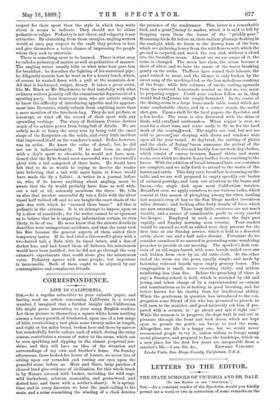CORRESPONDEN CE.
LIFE IN CALIFORNIA.
Stn,—As a regular subscriber to your valuable paper, and having read an article concerning California in a recent number, I imagined that a further insight into Californian life might prove interesting to your many English readers. Let them picture to themselves a square white house nestling among a heavy growth of brushwood, upon one of a low range of hills, overlooking a vast plain some twenty miles in length, and eight or ten miles broad, broken here and there by narrow but wonderfully fertile valleys, each of which, during the rainy season, contributes a stream of water to the ocean, which can be seen sparkling and rippling in the almost perpetual sun- shine, and they will have an idea of the situation and surroundings of my own and brother's home. On Sunday afternoons, those looked-for hours of leisure, we never tire of 'sitting upon our verandah and resting our eyes upon the peaceful scene before us. Here and there, large patches of cleared land give evidence of civilisation, for this whole track is by Nature covered with bushes, including the wild sage, -wild buckwheat, arbutus, manzanita, and greasewood, and -dotted here and there with a settler's shanty. It is spring- time, and in every direction we hear the quail calling to his mate, and a noise resembling the winding of a clock denotes
the presence of the road/tanner. This latter is a remarkable bird, and a great'enemy. to snakes, which it is said to kill by dropping upon them the leaves of the "prickly-pear." Humming-birds flit before us, their radiant plumage flashing in the sunlight, while we listen to the drowsy hum of the bees, which are gathering honey from the wild flowers with which the ground is carpeted, and watch the sun sink without a cloud into the boundless ocean. Almost ere we are aware of it, the scene is changed. The moon has risen, the ocean become a sheet of silver, and we hear the music of the waves breaking gently on the rocks. Thelbees have ceased their labours, the quail retired to roost, and the silence is only broken by the sweet song of the mocking-bird, or the less melodious croaking of the frogs ; while thin columns of smoke curling .upwards from the scattered homesteads remind us that we, too, must be preparing supper. Could your readers follow us in, they would find the: rooms but simply furnished. In the centre of the dining-room is a large home-made table, round which are some comfortable chairs, and in a corner stands the useful shot-gun. Upon a shelf lie the local papers, the Spectator, and a few books. The room is also decorated with the skins of birds, wild cats,rand rattlesnakes. When supper is over, we read for a short time, and retire early, to fit us for the hard work of the coming] week. The nights are cool, but not too cold to prevent:our sleeping with doors and windows wide open all the year round. At daybreak, the rattling of plates and the sizzle of frying' bacon announce the arrival of the breakfast-hour. We rise and hastily don our week-day clothes, which consist of canvas trousers, flannel shirts, and warm socks, over which are drawn heavy leather boots reaching to the knees. With the addition of broad-brimmed hats, our costumes are complete, and we sally forth to attend to the wants of the horses and cattle. This duty over, breakfast is steaming on the table, and we are well prepared to empty speedily our basins of oatmeal-porridge, and turn our attention to the beans and bacon,—the staple dish upon most Californian ranches. Breakfast over, we apply ourselves to our various tasks, which consist at this season of ploughing among the vines, hauling last season's crop of hay to the San Diego market (seventeen miles distant), and looking after forty stands of bees, which are now swarming. These busy little creatures are not much trouble, and a source of considerable profit to every careful bee-keeper. Employed in such a manner, the days pass rapidly, and Sunday morning soon returns. -Your readers would be amused as well as edified were they present for the first time at our Sunday service, which is held in a deserted cabin, about one and a half miles distant. Fortunate do we consider ourselves if we succeed in persuading some wandering preacher to preside at our meeting. The speaker's desk con- sists of an old sugar-barrel, with some boards nailed over one end, hidden from view by an old table-cloth. At the other end of the room are the pews, equally simple, and made by fastening redwood boards upon empty grocery boxes. The congregation is small, never exceeding thirty, and seldom numbering less than five. Before the preaching (if there is any) a Sunday-school is held, which is attended by old and young, and taken charge of by a superintendent as earnest and conscientious as he is lacking in good breeding, and far better known for his charity than for intellectual ability. When the gentleman in question has introduced to the con- gregation some friend of his who has promised to preach, he will turn to the minister, and good-naturedly ask him, if pre- pared with a sermon, to "go ahead and spit it right oat." While the sermon is in progress, the dogs walk in and out at pleasure through the front and back doors, which are kept open to permit the gentle sea breeze to cool the room. Altogether, our life is a happy one, but we would never recommend people to try it, unless willing to forego many social pleasures, and prepared to face the hardships, which on a new place for the first few years are inseparable from a


































 Previous page
Previous page